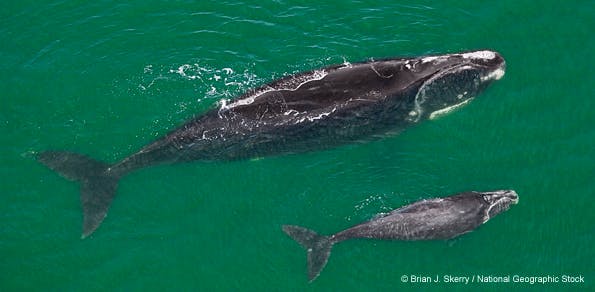Jane Davenport, Senior Staff Attorney
This month, Defenders of Wildlife and its allies announced a vital litigation victory in the ongoing battle to protect critically endangered North Atlantic right whales from lethal entanglements in commercial lobster fishing gear. The settlement agreement with the National Marine Fisheries Service (NMFS) came after Defenders and our co-plaintiffs challenged NMFS on its failure to protect right whales. It’s also an important step forward in protecting humpback, fin, and sei whales, all endangered and all at risk of entanglement.
Atlantic right whales face two major threats: collisions with large ships (ship strikes) and entanglements with commercial fishing gear. Every year, whales run a dangerous gauntlet as they follow their age-old migratory paths up and down the East Coast from Florida to Canada. This route takes them through some of the busiest shipping lanes and the most heavily fished areas in the United States.

Scientists from NOAA Fisheries Service attempt to save an entangled right whale. (Photo courtesy of EcoHealth Alliance)
Like all marine mammals, whales need to surface to breathe air. If they become entangled in fishing gear, such as nets and buoy lines, they will drown if they cannot reach the surface. Entangled whales also face slow, lingering deaths from infections or starvation, and become more vulnerable to ship strikes because of their impaired ability to swim while dragging heavy lines and gear. Despite heroic efforts to rescue entangled whales, not all of them can be identified and freed from their lethal burdens in time to save their lives.
Endangered whales are protected by some of our nation’s strongest environmental laws: the Endangered Species Act and the Marine Mammal Protection Act. But the National Marine Fisheries Service has continued to authorize the current operation and management of the American lobster fishery under these statutes, despite the fact that vertical lines running from the buoys at the ocean’s surface down to lobster pots and other gear on the ocean floor are responsible for entangling many whales each year. Defenders and our allies challenged this practice, arguing that NMFS needs to create and enforce new regulations to reduce entanglement, not continue to allow the lobster fishery to endanger whales.
Incredibly, NMFS had actually recognized the critical need for new regulations to prevent whale entanglements back in 2003. The agency’s foot-dragging has resulted in dozens of whales dying cruel and needless deaths and has hindered species recovery over the past decade. It needs to end, now.
Under the new settlement agreement reached this month, the agency must publish a final decision on a vertical line regulation by July 1, 2014. The settlement also requires the agency to conduct a new analysis under the Endangered Species Act of whether continuing to operate the American lobster fishery will jeopardize the survival and recovery of the four endangered whale species.

Right whale and calf, photo courtesy NOAA
The North Atlantic right whale is one of the most critically imperiled whale species in the world. Out of a population once numbering in the tens of thousands, fewer than 500 right whales survive. The loss of even a single right whale pushes the species ever closer to the brink of extinction. If current trends continue, scientists estimate, the species will become extinct in less than 200 years. Humpback whales, fin whales, and sei whales are also at risk of extinction, their numbers historically decimated by whaling and still nowhere near recovered despite decades of legal protection.
Together with our allies, Defenders of Wildlife has long been active in advocating and litigating to ensure that endangered whales are protected to the fullest extent of the law. Although we have won an important battle with this settlement agreement, we must continue our vigilance and be prepared to return to court in the fight to protect these magnificent creatures.





